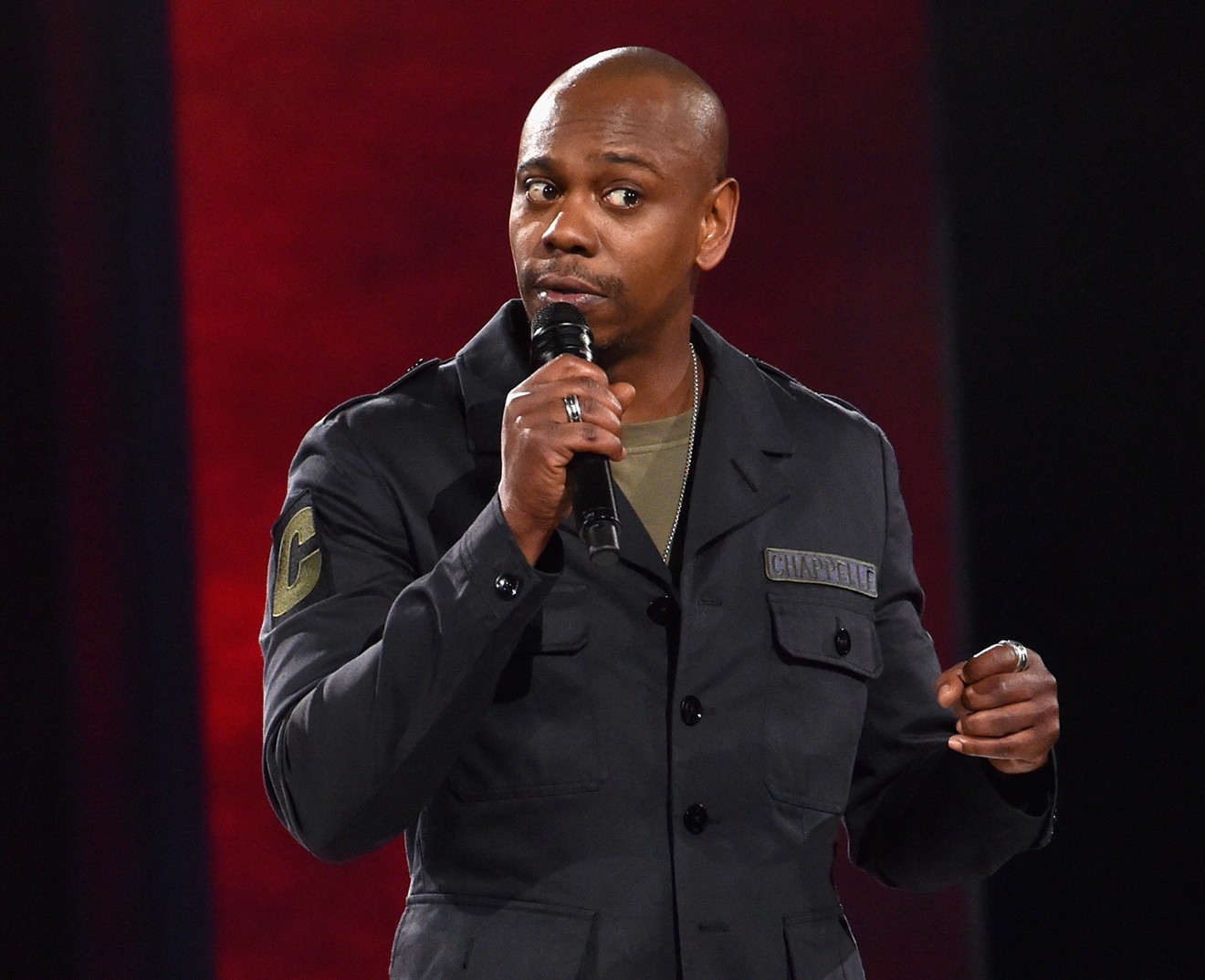When it comes to dealing with society's ills, comedians are lousy physicians. The best of them can diagnose the hell out of the body politic. But when it comes to prescribing a cure to what ails us, forget it. They went to clown college, not med school.
Some comics, whether they want the job or not, end up as elder statesmen. And while being the voice of a generation can have its perks (TV deals! Huge followings! Best-sellers!), it also means having to deal with a level of social responsibility and check-your-privileging that most other comedians don't have to sweat as hard about. For comics on this level, an off-the-cuff gag can turn into a political firestorm.
There's even a name for this phenomenon: The Fey Effect. It's when a comedian's work triggers a shift in public perception towards politicians and social issues. The name stems from Fey's impersonation of Sarah Palin, which helped cement Palin's image as an Alaskan ditz in the public imagination.
For a recent example of The Fey Effect at work, look no further than a recent guest spot by the comedian on Saturday Night Live's Weekend Update (which she used to anchor with Jimmy Fallon, then Amy Poehler). Appearing on SNL's news segment shortly after the Charlottesville tragedy, Fey performed a bit on how the best way to respond to white nationalist rallies was to stay home and devour an American flag sheetcake. Touching on the idea of "eating your feelings" and displaying how helpless the political climate in this country is making people feel, Fey ramped up the absurdity by delivering most of her monologue while wolfing down forkfuls of cake.
The sketch touched a nerve. While there were many folks who appreciated Fey's dessert-mauling humor, there were also critics and fans who felt that the comedian was misusing her power as a "spokeswoman" and was encouraging fellow liberal white women to stay home. Considering how that particular pussy-hat-wearing demographic aren't known for showing up and supporting POCs or trans communities, suggesting they stay home and twiddle their cake batter-covered fingers while literal Nazis march the streets seems pretty irresponsible. And no matter how funny the joke is, it's hard not to have flashbacks to Marie Antoinette breezily declaring “let them eat cake” while the masses starved outside the walls of Versailles.
But there's an important question that this backlash puts to the test: Is it fair to saddle a comedian like Fey with this kind of big-league rhetorical status when their whole schtick isn't inherently political?
Fey is a comedian with a reputation for being political that's more of an audience projection than actual truth: She seems more interested in joking about night cheese than questioning racial injustice or capitalism. Bossypants is a fun read, but it's not Das Kapital. Liz Lemon isn't about to man barricades anytime soon.
The criticisms against her felt like they were attacking the comic for failing to be an ideal she had never set out to be in the first place. The condemnations of her lack of social responsibility were strangely familiar.
In many ways, it felt like an echo of the backlash Dave Chappelle experienced earlier this year.
Chappelle is certainly a comic capable of generating a Fey Effect. His sketch comedy work on his acclaimed Chappelle's Show is still eerily prescient and on-point with how hilariously and brutally it dissects racism in America. Whether it's a Law & Order parody showing what would happen if a black drug dealer was treated the way a stockbroker would be on trial or a jury selection sketch showing exactly why so many black people wanted to give O.J. the benefit of the doubt, his comedy was thought-provoking and gut-busting.
His work also gained some moral authority when he quit his Comedy Central show in 2006. Worried that his material was being abused and misinterpreted by white audience members who laughed at punchlines for the wrong reasons, Chappelle did the unthinkable: He walked away from millions of dollars, fame, and cultural relevancy. All on a matter of principle. It's an act of “self-sabotage” that's almost inconceivable in our “there's no such thing as selling out anymore” society, where woke superstars like Kendrick Lamar shill for sneaker ads.
So when the reclusive comedian dropped two specials on Netflix this year, it was almost as surprising an event as a new season of Twin Peaks airing on TV. Sure, he'd do the occasional stand-up show or Michel Gondry concert film, but it seemed unlikely that he'd release another hourlong special anytime in the future (let alone two of them).
But then he took a guest hosting spot on SNL – the first celebrity host on the show since President Donald Trump's election. Opening with a long, thoughtful, and raw monologue, it was everything fans could have hoped for from Chappelle. The fact that he also brought back Chappelle's Show characters like Tyrone Biggums or the Player Haters was just icing on the cake. It was a return to form after all the years he spent out of the spotlight, and it showed that he still had the goods.
For most comedians, releasing two specials at once would be an act of hubris. For someone of Chappelle's caliber, it's a full-on power move.
The fact that the two specials, The Age of Spin and Deep in the Heart of Texas, were absolutely hysterical made them must-sees. Dave still had a gift for eliciting belly laughs and cringes alike with his oh-shit-he-went-there material. The same impish, Steve Urkel "did I do that?" glint shone in his eyes when he dropped certain jokes, even if he looked and moved like a new man. The old Dave Chappelle was a wiry beanpole, bursting with nervous energy. This version was stockier – a man who looks like he hits the gym and sounds like he might hit the bottle. The old version moved around onstage like he was trying to throw off a sniper's aim, while new Dave planted himself on a stool and told stories like an old timer at the bar.
Within hours of the specials going live, reviews and hot takes were popping up everywhere. And while a lot of the response was positive, there was backlash for some of Chappelle's jokes about his reluctance to switch up his “pronoun game,” and his riffs on the gay community.
Like Fey, a lot of the hand-wringing over his specials felt personal. Chappelle was accused of being out of touch, transphobic, insensitive, a man out of step with the times. He was a voice of a generation who misspoke, a hero who fell short, a prophet who got caught behind the burning bush with a lighter and megaphone in his hands.
To be fair: There's iffy material in those specials.
Just like in his sketch shows, Chappelle fired shots at lots of targets, and some shots were cheaper than others. But even when Chappelle seemed to "punch down," it didn't seem hateful. When he expressed exasperation over the way his wife's gay friends treated him, it didn't feel like he was casting judgment on an entire group of people. It felt like he was bitching about these particular individuals. His controversial joke about a man getting a sex change to trick other people into sleeping with him felt more like a detour into sheer absurdity than outright gay panic.
It's in his jokes about the trans community where Chappelle may have overstepped. While his jokes about the frustrations of dealing with pronouns can ring true for anyone who had no idea what “cis” meant five years ago, it does also show a weird lack of empathy on his part. But in some way, that kind of blind spot makes sense when you consider Chappelle's love for golden era hip-hop. Even “woke” groups like De La Soul and Public Enemy could display moments of head-slapping ignorance. P.E.'s Fear of a Black Planet is an amazing record, even though its antisemitism and homophobia sound as ugly now as they did when the record first dropped. The same could be said for Dave's recent specials.
In an era where we expect our heroes to be 100 percent woke, Chappelle was still sleeping on a few essential issues. And that's a problem for many people because Chappelle isn't just a comic: He's a role model. A telling truth to power comedian. He's not allowed to just be funny.
The same thing is playing out with Fey right now. Each entertainer is being criticized, to some degree, for being something that they're not. Fey was never really the second coming of Emma Goldman, and Dave has never been super-progressive about either the gay community or trans folks in his past work. When it comes to diagnosing and dissecting white/black race relations in America, Chappelle still has got a sharp eye and sharper tongue. But when it comes to drawing parallels between his culture's struggles and the shit that other minority groups put up with, the dude has never been a master at connecting those dots.
It's reminiscent of the critical pounding Fey's old co-anchor Jimmy Fallon got when he had Donald Trump on as a guest on his late-night talk show. Fallon was taken to task for treating the then-presidential candidate with kid gloves. Running his hands through Trump's hair, cracking innocent jokes – he was called out for normalizing the man (much as SNL was accused of the same thing when Trump guest-hosted the show). But let's be real: this is who Jimmy Fallon is. He's an eager-to-please puppy of a man. He's never going to Animorph into Edward R. Murrow and grill Donny T with some probing, insightful questions. Tongue-lashing him for that makes about as much sense as getting angry at a hammer for not being a remote control.
At the end of the day, it isn't an artist's job to manage people's expectations or reactions to their work. They put it out there and can only hope for the best. Sometimes it gets perverted, and racist bros fail to realize they're the butt of the joke, or maybe some suburban centrist moms use sheetcaking as an excuse to not do anything at all. Just because we want our heroes to be woke doesn't mean that they actually are, or will ever be.
Expecting Tina Fey to give you an answer on how to deal with white nationalism is about as wise as asking a Walmart greeter to explain how string theory works. She and Chappelle aren't leaders of the revolution or paradigm shifters. They're here to write jokes and make us laugh. And in these uncertain times, where the daily news feels like a never-ending stream of bad jokes, we need people to give us some good ones.
Dave Chappelle is performing at 7 and 10 p.m. on Saturday, September 2, at Comerica Theatre. Tickets are $69 to $90 and available through Livenation.
[
{
"name": "Air - MediumRectangle - Inline Content - Mobile Display Size",
"component": "18478561",
"insertPoint": "2",
"requiredCountToDisplay": "2"
},{
"name": "Editor Picks",
"component": "16759093",
"insertPoint": "4",
"requiredCountToDisplay": "1"
},{
"name": "Inline Links",
"component": "17980324",
"insertPoint": "8th",
"startingPoint": 8,
"requiredCountToDisplay": "7",
"maxInsertions": 25
},{
"name": "Air - MediumRectangle - Combo - Inline Content",
"component": "16759092",
"insertPoint": "8th",
"startingPoint": 8,
"requiredCountToDisplay": "7",
"maxInsertions": 25
},{
"name": "Inline Links",
"component": "17980324",
"insertPoint": "8th",
"startingPoint": 12,
"requiredCountToDisplay": "11",
"maxInsertions": 24
},{
"name": "Air - Leaderboard Tower - Combo - Inline Content",
"component": "16759094",
"insertPoint": "8th",
"startingPoint": 12,
"requiredCountToDisplay": "11",
"maxInsertions": 24
}
]











